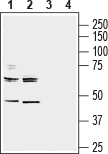Overview
- Peptide (C)RFPGHRVPIRASPR, corresponding to amino acid residues 167-180 of mouse Neuregulin-3 (Accession O35181). Extracellular, N-terminus.

 Western blot analysis of mouse (lanes 1 and 3) and rat (lanes 2 and 4) brain membranes:1,2. Anti-NRG3 (extracellular) Antibody (#ANR-115), (1:200).
Western blot analysis of mouse (lanes 1 and 3) and rat (lanes 2 and 4) brain membranes:1,2. Anti-NRG3 (extracellular) Antibody (#ANR-115), (1:200).
3,4. Anti-NRG3 (extracellular) Antibody, preincubated with NRG3 (extracellular) Blocking Peptide (#BLP-NR115). Western blot analysis of human MCF-7 breast adenocarcinoma cell lysate (lanes 1 and 3) and human MDA-MB-231 breast adenocarcinoma cell lysate (lanes 2 and 4):1,2. Anti-NRG3 (extracellular) Antibody (#ANR-115), (1:200).
Western blot analysis of human MCF-7 breast adenocarcinoma cell lysate (lanes 1 and 3) and human MDA-MB-231 breast adenocarcinoma cell lysate (lanes 2 and 4):1,2. Anti-NRG3 (extracellular) Antibody (#ANR-115), (1:200).
3,4. Anti-NRG3 (extracellular) Antibody, preincubated with NRG3 (extracellular) Blocking Peptide (#BLP-NR115).
- Avramopoulos, D. (2018) Am. J. Med. Genet. B Neuropsychiatr. Genet. 177, 257.
- Abe, H. et al. (2017) BMC Genet. 18, 69.
- Tost, H. et al. (2014) J. Neurosci. 34, 1051.
- Hayes, L.N. et al. (2016) Mol. Neuropsychiatry 2, 79.
Neuregulins (NRGs) are single-pass membrane proteins belonging to a multi member family of epidermal growth factor (EGF)-like signaling molecules involved in cell-cell communication. This family includes four human neuregulin paralogs NRG1-NRG4 with multiple isoforms through alternative splicing1.
Neuregulin 3 (NRG3) plays a key role in the embryonic cerebral cortex development by regulating the migration and patterning of neural progenitor cells. It specifically binds to the ErbB4 receptor tyrosine kinase in the developing mammalian forebrain2,3.
Neuregulin 3 is almost exclusively expressed in the nervous system with highest expression in the anterior cingulate and frontal cortex3,4.
Mutations in the neuregulin 3 gene are linked to different mental disorders accompanied with cognitive and behavioral abnormalities such as developmental delay, cognitive impairment, and psychiatric illness2,3. Single nucleotide polymorphisms are associated with delusions in patients with schizophrenia and linked to the disease itself. Knockout mice display novelty-induced hyperactivity and are deficient fear conditioning4.
Application key:
Species reactivity key:
Anti-NRG3 (extracellular) Antibody (#ANR-115) is a highly specific antibody directed against an epitope of the mouse protein. The antibody can be used in western blot analysis. It has been designed to recognize Neuregulin-3 from rat, mouse, and human samples.
